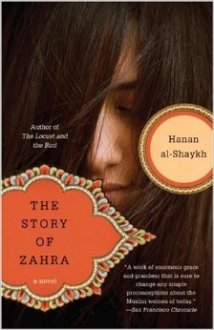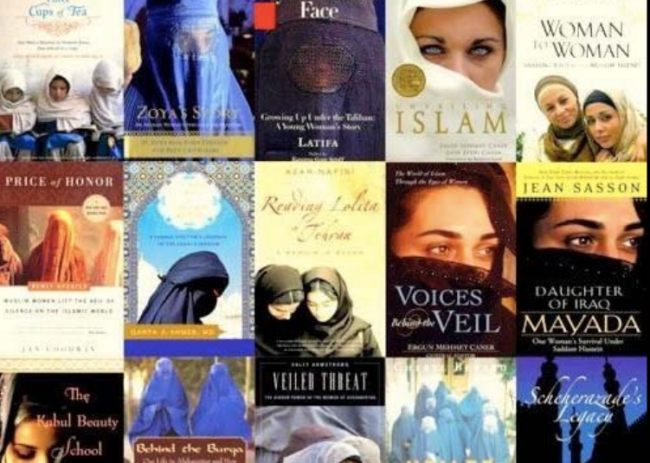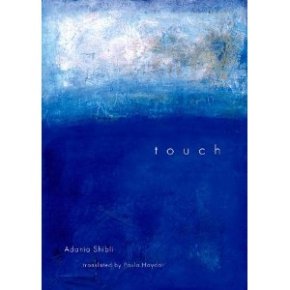Inspired by the “Arabic Literature (In English)” blog, I will be reading texts by Arab women in translation during 2014. Taking the idea of #readwomen2014 and pushing it to consider women writing in Arabic, the blog offers a calendar of suggested titles to add focus to the project and bring such writers to the attention of a reading population that might need a nudge to listen to the voices of a variety of women. Luckily, I had read the January title Hanan al-Shaykh’s Story of Zahra for a friend’s independent study I crashed a few times during my dissertation stage when I craved talking about a book with anyone other than myself and my kind and patient advisor. The blog suggests that this novel is a great “starter” novel when it comes to Arab women’s writing, and I would agree based on my memory of the book.
I find myself sighing as I post this picture, as once again I see a cover depicting a woman looking down. Even if she isn’t wearing a veil, she may as well be since this cover echoes those of books published for a Western audience. For more on that idea (if you haven’t heard the hour lecture I do on this same topic), check out Adam Talib’s talk “How to Translate for Bigots” in which he discusses the issue of cover art that depicts women in the Arab world. I love that the title of this picture is “Covered Covers.”
In February I read touch, Adania Shibli’s 2002 novel translated by Paula Haydar. Because I come to this body of literature with less knowledge than I would like to have, I plan on spending some time learning about the authors as well in hopes of introducing readers to new female writers. Of personal note: Shibli and I are contemporaries, as we were both born in 1974. She and I will both be turning 40 this year, and she has accomplished much in this lifetime.
(Photo Credit: Stavros Petropoulos)
Born in Palestine, Dr. Shibli currently lives in Berlin. She has written short stories, essays, and two novels, the second published in 2004 entitled We Are All Equally Far From Love. Both novels garnered several accolades and earned Shibli the A.M. Qattan Young Writer: Palestine award. touch was also longlisted for the 2011 Best Translated Book Awards.
The novel’s title is perfect as it reflects the sensory element of the novel and the writing style. The book is organized by the senses and how we make sense of them. The chapters–“colors,” “silence,” “movement,” “language”–reflect several senses: sight, hearing, and most importantly, touch. The final chapter, “the wall,” is one page and breaks from the sensory theme, just as the main character must break from her world.
The short, one-syllable title does not boast a majuscule “T.” The novel is almost as short as its title. Each section within the chapter is short, loaded. Reader, do not be deceived: though this novel (really novella) is only 72 pages, it does not read quickly. The writing is as sparse as the title. The book leaves us with a desire to find solid footing and cannot be rushed.
touch tells the story of a young girl in Palestine. She earns no name in the book. Her anonymity lends her a universal quality as she comes of age during a time of strife and struggle. The reader experiences her world through the senses, and only through them do we learn of the actions that occur in her world, the most important of which are the death of her brother and falling in love. The entire book is suffused with longing for connection, one that will not come to her (hence the final separation in the final chapter “the wall). Her senses deny her any satisfaction. For example, she wishes to hear her brother’s voice after an ambulance delivers his dead body to their home: “The little girl listened very closely to the dead brother, but silence was all there was of him, forever” (23). There is no movement in her world after his death: “The sky had not changed its silence or its shape or its position after the brother’s soul rose up to it” (43). As she tries to find her voice, she can only piece together stories from what she overhears the rest of her family saying. She catches the phrase “Sabra and Shatila,” an event that I had to learn about along with her as I am embarrassed to admit I had never heard of this massacre.
Reading this novel is a raw experience and takes time and patience, though in the end the investment is worth it. Shibli’s novel earned such attention because of her ability to write the story of a young girl trying to grow up in a tumultuous and unwelcoming environment. The girl feels separated from her world, her family, her love, and her voice. This disconnect makes it challenging to sit with the novel for more than a few pages at a time, and there is no neat ending that satisfies our hopes for the girl we come to care about, even if we do not know her name.
I am leaving touch behind to read March’s selection, Samar Yazbek’s Woman in the Crossfire, though I am sure I will not forget this book and its protagonist anytime soon.
I hope these posts encourage you to read some of the year’s selections and engage in the dialogue happening online. I would be happy to hear your comments about your experiences reading these books. Until March…




